- Home
- Claire North
The Sudden Appearance of Hope
The Sudden Appearance of Hope Read online
Begin Reading
Table of Contents
Newsletters
Copyright Page
Hachette Book Group supports the right to free expression and the value of copyright. The purpose of copyright is to encourage writers and artists to produce the creative works that enrich our culture.
The scanning, uploading, and distribution of this book without permission is a theft of the author’s intellectual property. If you would like permission to use material from the book (other than for review purposes), please contact [email protected]. Thank you for your support of the author’s rights.
Chapter 1
They said, when they died, that all they could hear was the screaming.
I run ink across the page, watch the world through the windows of the train, grey clouds over Scotland, and though the screaming continues still, it does not bother me. Not any more.
I write this to be remembered. Will you judge me, in reading this? Who are you? Liar, cheat, lover, thief, husband, wife, mother, daughter, friend, enemy, policeman, doctor, teacher, child, killer, priest? I find myself almost more excited by you than I am by myself, whoever you might be.
Whoever you are: these are my words.
This is my truth.
Listen, and remember me.
Chapter 2
The world began to forget me when I was sixteen years old.
A slow declining, one piece at a time.
My dad, forgetting to drive me to school.
My mum, setting the table for three, not four. “Oh,” she said, when I walked in. “I must have thought you were out.”
A teacher, Miss Tomas, the only one in the school who cared, full of faith in her pupils, hope for their futures, forgets to chase the missing homework, to ask the questions, to listen to the answers, until, finally, I didn’t bother to put up my hand.
Friends, five who were the heart of my life, who I always sat with, and who one day sat at another table, not dramatically, not with “fuck you” flair, but because they looked straight through me and saw a stranger.
A disassociation between name and face as the register is called. My name is remembered, but the link is broken; what is Hope Arden? A scrawl of ink without a past; no more.
First you forget my face, then my voice, and at last, slowly, you forget my consequences. I slapped Alan, my best mate, the day he forgot me. He ran from the room, horrified, and I ran after him, red with guilt. By the time I found him, he was sitting in the corridor of the science block, cheek flushed, rubbing at his face.
“You okay?” I asked.
“Yeah,” he replied. “Face hurts a bit.”
“I’m sorry.”
“It’s okay; not like you did nothing.”
He looked at me like a stranger, but there were tears in his eyes when he spoke. What did he remember then? Not me, not Hope Arden, the girl he’d grown up with. Not my palm across his face, not my screaming until the spit flew, remember me, remember me. His pain was diminishing, taking with it memory. He experienced sorrow, rage, fear, these emotions glimmered in his eyes, but where were they from? He no longer knew, and the memory of me crumbled like sand castles before the sea.
Chapter 3
This is not a story of being forgotten.
As memory of me faded, so did a part of myself. Whoever that Hope Arden is who laughs with her friends, smiles with her family, flirts with her lover, resents her boss, triumphs with her colleagues – she ceased to exist, and it has been surprising for me to discover just how little of me is left behind, when all that is stripped away.
If words on the page are the only part of me that can be remembered, and I am to write something which will survive when I am gone, it should matter.
A story of Perfection, then.
For you, it begins in Venice. That was certainly the first time the world became aware of what it was. But for me, and the part I was to play in it, the story began earlier, in Dubai, the day Reina bint Badr al Mustakfi killed herself in her hotel room on the seventh floor of the Burj al Arab Jumeirah.
Because the room cost £830 a night, and because it was clearly a suicide and thus a social faux pas, the body was rushed out of the service door within hours of discovery. A Nepalese cleaning lady was sent in to scrub at the worst of the stains, but Reina had been helpful in slitting her femoral artery in a hot bath, and thus only a few towels and the bath mat needed to be burned.
I found out she was dead because her cousin, Leena, kept on screaming. Not crying – just screaming. In later tellings of these events, she would not say the words, “My cousin Reina killed herself, and this is why” but instead, “My cousin Reina killed herself, and I’ve never recovered from the blow.”
I didn’t like Leena much. It made it a lot easier to steal from her.
I liked Reina. She didn’t know that we were friends, but that’s okay – I don’t mind these things.
I broke into the morgue where they’d taken Reina’s body, a false name on the tag around her toe, skin as grey as the steel bed she lay on. I riffled through the clothes they’d stripped from her, flicked through a notebook of curious ideas and comments on passers-by, found myself in the descriptions there: Woman, skin like milk in coffee, deep, diluted. Pink headscarf, very close-trimmed nails, stands tall, bag in her left hand, looks at everyone without shame, doesn’t care that people stare.
I took the notebook, pressed it against my heart, then put it in my pocket, a thing to cherish and keep safe.
Her phone was in a clear plastic bag by her shoes, and the unlock code was easy to guess by the oily stain her fingers had left as she swiped across the screen. I took it, and sat on the steps of the morgue in the burning shade, flicking through messages and emails, looking for something cruel or a cry of pain to explain why Reina was now cold in the quiet building at my back.
I only found Perfection because it flashed a notification at me.
It’s been forty-eight hours since you last hit the gym – that body won’t become perfect by wishing!
An app, running in the background on her phone.
Careful what you buy today – that last shop took you over your recommended saturated fat levels for the day! Do you know that saturated fat is a leading cause of cardiac problems?
What the hell kinda app was this?
I opened it, curious.
Make the perfect you.
The interface was simple, streamlined. There would be no accessorising, no customisation.
Perfection is real. Perfection is now.
A policeman came up to me, asked me if I was lost. I closed the mobile phone, put it in my pocket, smiled and said no, sorry, just came over dizzy.
He said, gently and calm, “Every human grief you will ever experience has been experienced by humans living and humans yet to come. There is no readiness for it, nor no easing of the pain, but ma’am, for what it’s worth, I think you should know that all of humanity that was, is and will be is with you now, by your side.”
I smiled and thanked him and ran away before he could see me start to cry.
That night, lying on my belly in the hotel, sea below, dust above, I signed up for Perfection.
I gave it a fake name, a dead email address knocked together in a café.
By joining, I automatically earned five hundred points; enough for $5 off a vitamin drink from an endorsed brand. It pinged my location off the wireless, had my position within five metres, found a health-food drink store within half a mile that would accept my voucher.
Advance faster – link your life.
It asked for a photo of me. I supplied a photo of a stranger, lifted from Facebook.
From this, it informed me that I had a wonder
ful body, but it could be made perfect.
Consider switching your diet – here are some tips.
Find the perfect exercise for you!
A questionnaire. I filled it out, and was informed that the perfect exercise for me was medium-distance athletics. A list of suitable trainers was supplied, along with the points value that I would win by signing up with any one of these Perfection-certified clubs.
Link your life, it reminded me. Make the perfect you.
It asked me for my bank details.
By giving this application access to your financial records and spending, Perfection can see the true you. Make your career and lifestyle habits perfect, with customised advice for you.
I refused to input the data, and when I checked again the next morning, I’d lost two hundred points.
Perfection is hard, it said. The power is within you.
I closed the app and restricted its access to my phone.
Chapter 4
Things that are difficult, when the world forgets you:
• Dating
• Getting a job
• Receiving consistent medical attention
• Getting a loan
• Certificated education
• Getting a reference
• Getting service at restaurants
Things that are easy, when the world forgets you:
• Assassination
• Theft
• Espionage
• Casual cruelty
• Angst-free one-night stands (w/condoms)
• Not tipping
For a while after I’d been forgotten, I toyed with becoming a hitman. I pictured myself in leather jump suits, taking down my targets with a sniper rifle, my dark hair billowing in the wind. No cop could catch me; no one would know my name. I was sixteen years old, and had peculiar ideas about “cool”.
Then I did some research, and found that a contract killing can be bought for €5,000, and the majority of people who worked in the field were brutal men in nylon tracksuits. There were almost certainly no glamorous women slipping a vial of something into the villain’s drink; no cocktail parties where spies exchanged cryptic understandings, no goddess of death, no woman of mystery. Only a flash of brutality in the dark, and the smell of tyres on tar.
Later, as I hunkered down in my sleeping bag beneath the library stairs, I closed my eyes and wondered how I had come to the conclusion that murder was acceptable. In my predicament, deprived of family and hope, I already knew that crime was how I would survive, but did that mean human life had lost its sanctity? I pictured killing a stranger, and found it was easier than killing a friend. Then I slept, and in my dreams men beat me, and I tried to hit them back, and couldn’t, my arm frozen in the air, my body powerless.
Do it, do it, do it, screamed my slumbering mind. Do it! Do it! DO IT!
And still I didn’t move, and when I woke in the morning, I found someone had pissed on the end of my sleeping bag.
Chapter 5
Have you got Perfection?
Memories – do I need to explain what went before, to explain myself? Perhaps. There is a word Reina sometimes used – pilgrimage.
Pilgrimage: a journey made for exalted reasons.
A holy act.
And then again, Google search: Pilgrimage is
out of date
a waste of time and money
still important
Have you got Perfection, she asked, and where was this?
Dubai, a few days before Reina died. A hotel on an artificial island; the Burj al Arab Jumeirah. When I walked in, a man offered me a chilled hand towel, a woman offered me dates in a golden plate, the receptionist asked if I’d be wanting one of the hotel’s Bentleys. £650 bought you the cheapest room for a night, but for so little, your private butler might be a touch rude, and you didn’t get access to the VIP lounge. Is this where it begins? I think it is.
“Have you got Perfection?” Leena asked, and behind her, Reina sighed. “The CEO is coming to Dubai. We’ve got a thriving investment market here; you wouldn’t think companies like that needed investment, but something like Perfection, it’s going to go global, it’s going to go mega, I know, it’s changed my life! I’m going to get treatments!”
Five women on couches in the spa, the sea blue as the morning sky, the midday sky white as the midnight moon, filling the windows all around. Drinks in multicoloured layers brought in by Bangladeshi women with bright smiles, bowed heads. Of the five of us being served, only two were from Dubai, a princess something-something-of-somewhere with flawless English and her cousin Reina, who perhaps wasn’t a princess but it was hard to tell, who blogged about social reform and women’s rights and was, according to Leena:
“Wonderful, isn’t she just wonderful, but I do wish she was a little more… well, you know…”
A gesture, taking in the silent figure of Reina, who unlike the rest of us is wearing a swimsuit, not a bikini, and lies on her couch with laptop open, brows tight against the top of her nose.
“Treatments destroy your soul,” replied Reina quietly from her laptop, not looking up. “Treatments destroy who you are.”
“Darling,” exclaimed Leena, “some of us see that as a good thing.”
Now Reina’s gaze snapped up, met her cousin’s, held, turned away. “I just want to be myself,” she murmured.
“But is that good enough?” Leena mused, “Or is it just selfish?’ I went to sit by Reina’s side, asked what she was working on while the others relaxed around her.
“This is my jihad,” replied Reina, not looking up from her laptop. “This is my pilgrimage.”
Jihad: to struggle. To strive in the way of God.
I’ve always liked knowledge. It makes me feel like I’m real, part of something after all.
“Yesterday the police arrested a fourteen-year-old girl accused of sex outside marriage with an ice-cream vendor,” Reina mused, speaking to the computer, having learned long ago that no one else would listen to her. “He raped her, and will be deported. She is going to prison for adultery. I cannot accept that the rights of women are culturally relative.”
“You see!” exclaimed Leena, rolling on her couch so that the Filipino woman applying her platinum-metal body tattoo could reach the back of her neck. “Reina’s just so… so… well isn’t she just!”
“Have you got Perfection?”
An American woman, Suzy or Sandy or Sophie or something of that sort, who lay, back bare, chin down as thin pieces of gold foil were delicately brushed onto her skin, creating swirls and curves of thousand-dollar colour that followed the contours of her perfectly scrubbed, perfectly tanned, perfectly toned, perfect flesh.
I leant over from my couch to see what she was talking about.
“It’s an app,” she explained, turning for me to look. “A life-coaching tool, a way to make a better you. You sign up, give it access to your data, and it helps you get better!”
“What kind of data?” I asked.
“Oh, everything, really. Loyalty cards, air miles, online shopping, bank accounts. The more information it has, the better it can help you. Like, when I first signed up, I took a picture of myself and it was able to tell me my height, weight, shoe size, the lot – it’s clever, just so clever. And I was overweight then, I mean – well, I won’t tell you! – but it found better menus for me, good trainers, because that’s what matters, isn’t it? And every time you reach a goal, like, getting to your perfect weight or buying the perfect shoes from an in-app retailer, you get points, and after a number of points you get a subscription-linked experience!”
“What kind of experience?”
“Oh, just amazing, amazing. At five thousand I got a free haircut at Pike and Ion, it was sensational, they just understand hair. At ten thousand I got three hundred dollars of spending money to use at the SpringYou outlet at the mall, three hundred! I couldn’t believe it, but of course, the app knew what I bought, and just by buying the right clothes I got
an automatic five-hundred-point bonus. I’m at fifty-two thousand points now, and can’t wait to see what the next unlock is.”
I smiled and said it sounded wonderful, amazing, how I could use something like that in my life.
“You should get it!” she exclaimed. “You’re so pretty already, with just a bit of work you could be perfect too!”
I smiled. This was my third day in the company of these women, and the first time they’d ever met me. I was good at being obliging.
And that evening,
“Do you have Perfection?” I asked Reina, as we ran together in the women-only gym, headscarves discarded, sweat clumping in our hair.
“Yes,” she mused. “I do. It’s something my family might invest in.”
“Is it as good as people say it is?”
“I… suppose it could be.”
“You don’t sound convinced.”
“It… Leena made me sign up, she told me I was… do you know how sometimes people say words and they should be terrible, but because you know the people and the way they say it, they aren’t? Only of course,” she added, “they are really.”
“What words?” I asked.
“Oh, the usual. Fat. Frumpy. Boring. Unattractive to men. Dull at parties. Frigid. Of course it shouldn’t matter, those are her things, not mine.”
Hi – are you sure this is the right restaurant for you? Here’s our list of recommended, Perfection-guaranteed suppliers!
We kept running. Then she said, “I used to think that it was okay just to be liked for being me.”
I nearly laughed, but there was such sadness in her eyes, and I was out of breath, so I didn’t. Instead, “People who see who you are like you for you, I’m sure of it.”
She smiled, and looked away, and we didn’t talk again that night.

 Gamehouse 01 - The Serpent
Gamehouse 01 - The Serpent The Master
The Master Gamehouse 03 - The Master
Gamehouse 03 - The Master The Thief
The Thief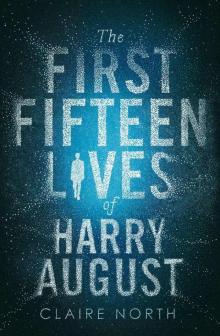 The First Fifteen Lives of Harry August
The First Fifteen Lives of Harry August The Serpent
The Serpent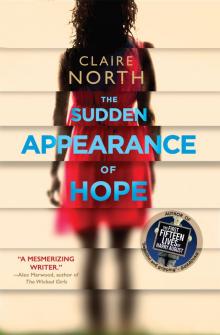 The Sudden Appearance of Hope
The Sudden Appearance of Hope The Pursuit of William Abbey
The Pursuit of William Abbey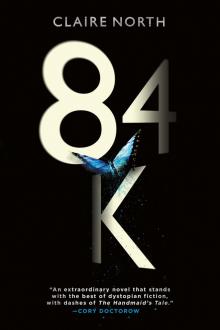 84k
84k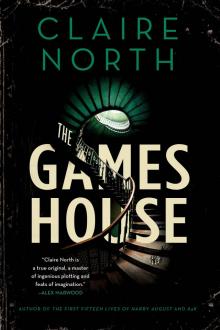 The Gameshouse
The Gameshouse Touch
Touch Sweet Harmony
Sweet Harmony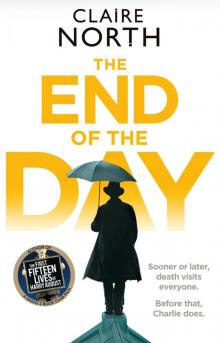 The End of the Day
The End of the Day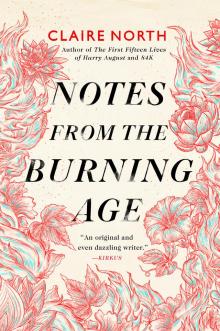 Notes from the Burning Age
Notes from the Burning Age